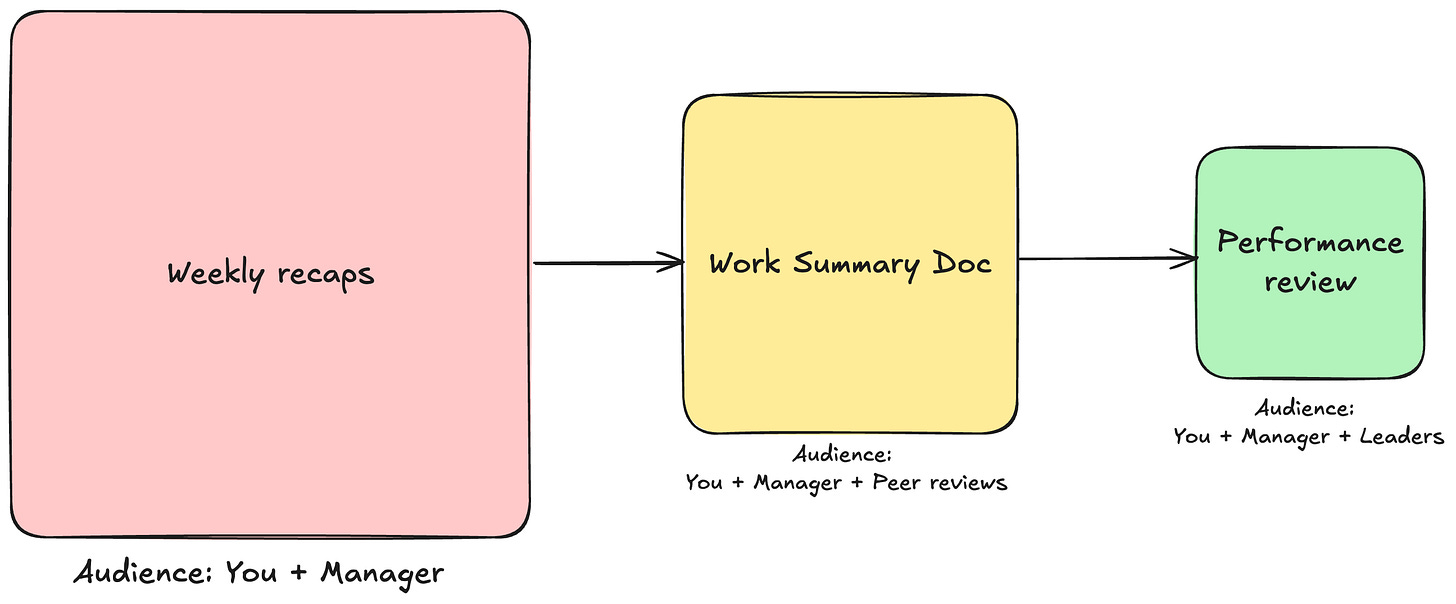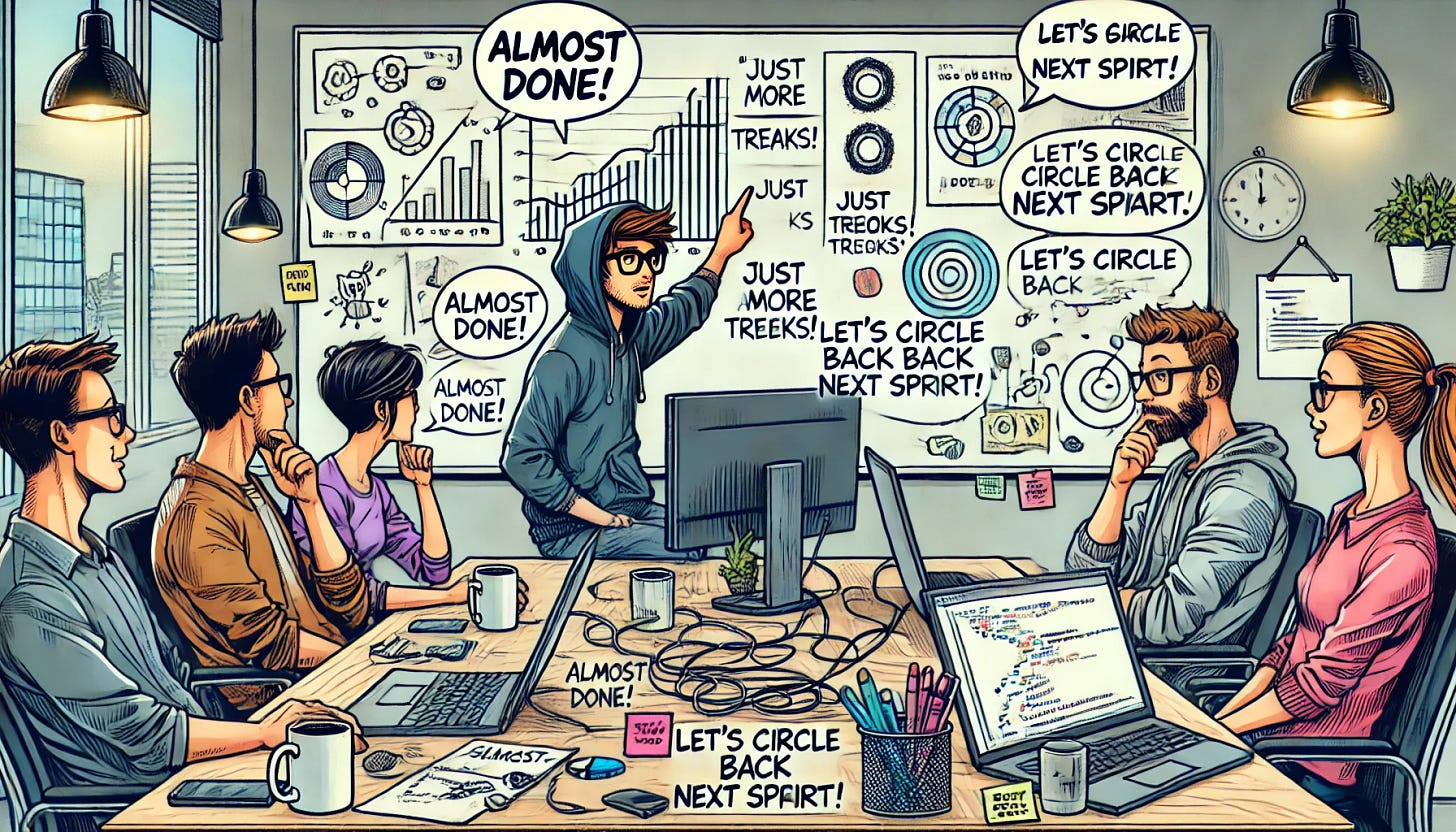How not to write your self-review
Learn dozens of common mistakes engineers make when writing their self-assessments during the performance review cycles. Do not be that guy.
This week, we got a lot of great advice on how to write your self-review. The performance cycles are getting close (if not complete, even in some companies), and we have some great content for navigating those like a boss 😎.
As we got two great articles on this topic, I decided to bundle them and declare them winners 🏅. It is my newsletter; I can do this kind of thing.
Mistakes to avoid when writing self-assessments (5 min) + 3 Mistakes to avoid when writing your performance review (7 min)
The Caring Techie Newsletter & High Growth Engineer
We are getting close to that time of the year - performance reviews 🫣 You will be doing a self-review soon, and you want to get the best out of it. This week, Irina Stanescu and Jordan Cutler are rocking it on this topic 🚀 . Irina’s article gives you eight common mistakes that can degrade your self-assessment. You want to avoid these as much as you can. Read this one, as you get eight mistakes to avoid in just 5 minutes of reading. Not a bad deal at all. Jordan’s article complements that with three additional mistakes to avoid.
After these two you will be fully equipped to write your self-review like a boss 💪.
Audience: All tech professionals
Value: Learn how to write your self-assessment
ToT Rating: ⭐⭐🌟
Why Engineers Join Unnecessary Meetings (4 min)
It is hard to find an engineer who would not love to cut down their time spent in meetings. Fran Soto shares simple advice you can use to get more “flow” time for yourself. If you don’t have four minutes to spend on this one (perhaps you would if you had fewer useless meetings 😉), I urge you to read at least the Exercise section. That one alone will improve your focus time.
Audience: Software Engineers
Value: Learn how to groom your meetings to get more focus time
ToT Rating: ⭐⭐
“The Coding Machine” at Meta with Michael Novati (12 min read, 1h 15 min podcast)
The Pragmatic Engineer
In the previous ToT issue, we got some insights into Meta’s engineering culture thanks to Anton Zaides and Gilad Naor. In this issue, we get more insights from Gergely Orosz’s interview with Michael Novati. There are some great insights here. One thing I liked is the concept of “archetypes” that Meta uses. In many companies, there is a problem of identifying how to grow towards senior+ positions and what people in these positions do. Meta uses archetypes to help with understanding the impact of people in these roles.
Audience: Software Engineers
Value: Learn about Meta’s engineering nuances
ToT Rating: ⭐⭐
"I'm not technical enough" is Rarely the Real Problem (5 min)
When a project starts to slip or delivery slows down, engineering (or product) leaders tend to blame their lack of technical skills. However, from her coaching experience, Yue Zhao observed that this is rarely the underlying root cause. This article gives you three real-life examples, that will make you think twice before jumping to spend days on Udemy, thinking that, you learning the latest software fad will make things better.
Audience: Engineering Managers
Value: Learn to focus on the right (management) problems
ToT Rating: ⭐⭐
What’s next after Senior Engineer? (8 min)
In this article Gregor Ojstersek talks about senior+ career growth. This is a very hot topic for engineers that reach the senior level. It is often not easy to decide where to further branch out your career. This article gives you great advice on how to evaluate your skills and map them to specific senior+ roles.
Audience: Software Engineers
Value: Learn where to grow after senior level
ToT Rating: ⭐⭐
How I give high-quality feedback quickly (6 min)
Wes Kao's Newsletter
Here are three great tips on how to provide feedback on documents. I like these tips as they are quite practical and make things better both for the giving and the receiving side.
Audience: All tech professionals
Value: Learn how to provide feedback on documents
ToT Rating: ⭐
Staff Engineer @ Meta by Age 25 | Evan King (7 min read, ~2h podcast)
The Developing Dev
Joining the latest wave of Meta stories, Ryan Peterman hosts Evan King, an engineer who got to Staff level at Meta by the age of 25 🤯 Evan shares both how his proactivity got him there and, quite candidly, how “hacking” his way to promotions cost him later on when he started his own company.
Audience: Software Engineers
Value: Learn how to get promoted fast (and the cost of it)
ToT Rating: ⭐
Applying the Core 4 framework (Part 1) (2 min)
Engineering Enablement
In previous newsletters, Abi Noda introduced DX Core 4 metrics and provided 2024 DX Core 4 industry benchmarks. In this super brief article, you get an out-of-the-box survey template for capturing DX Core 4 metrics for your engineering organization. Pure value you can immediately use to measure developer productivity in your org in this one 🚀
Audience: Engineering Managers (DevEx)
Value: Learn how to measure developer productivity
ToT Rating: ⭐
Leveling Up Hacks - Share Your Progress (5 min)
Path to Staff Engineer
This brief article shares great advice on how to share progress effectively. Communicating with stakeholders is a crucial factor for your career growth. And this article even gives you a template for sharing progress you can use immediately for your projects.
Audience: Software Engineers
Value: Learn how to share progress
ToT Rating: ⭐
5 learnings when building and scaling a service-based tech company (8 min)
Engineering Leadership
Ever wanted to get some clients and start a company with a couple of your coder friends? If so, this article will give you some great insider advice for managing a service-based tech company. It focuses both on how to work with this type of business internally and how to handle your clients externally.
Audience: Enterpreneurs
Value: Learn about service-based tech companies
ToT Rating: ⭐
That’s all for today! ✅
Now stop scrolling and go write that self review like a pro! 🚀



